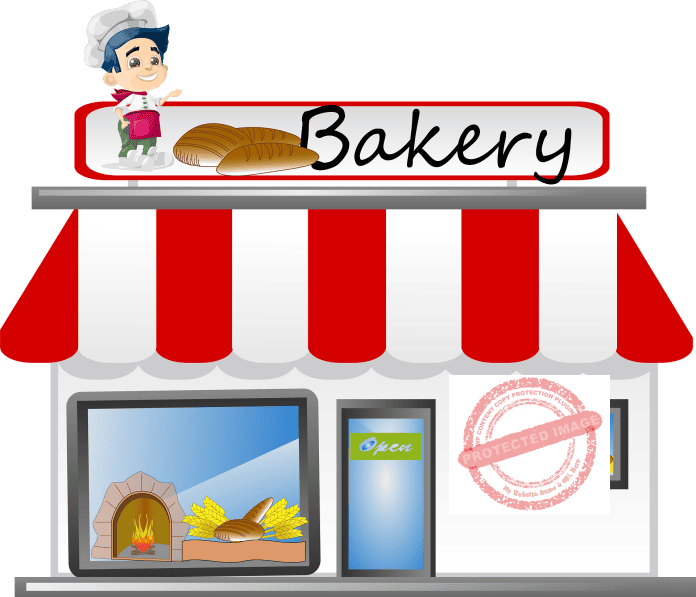Starting a bread bakery business is a beautiful venture that can bring joy to your customers and satisfaction to your entrepreneurial ambitions. We have decided to answer your question on ‘how to start a bread bakery business’ for many reasons. The smell of fresh bread wafting through your bakery can be irresistible to passersby. The taste of a warm, crusty loaf can create loyal customers for life. However, like any other business, starting a bread bakery requires careful planning and preparation to ensure success.
Before you begin your journey into bread baking, it’s important to understand the basics.
Baking bread is a time-honoured tradition that requires patience, attention to detail, and an understanding of the science behind things.
It starts from selecting the right flour to proofing the dough; every step of the process can make the final product even better.
Whether you are starting a bread bakery business or a cake business – starting is generally hard.
Even with how challenging starting a bread bakery business is, it is also a very rewarding experience to have.
So, how does one start a bread bakery business?
The truth is, it is not as complicated as you think.
As you continue to read, we will break down what it takes to begin a bread bakery business.
However, before we get into that, let’s look at the business’s pros and cons.
The Bread-Baking Industry – How to Start a Bread Bakery Business
The bread bakery industry is a vibrant and growing market that offers many opportunities for entrepreneurs looking to start a business.
According to a report by Grand View Research, the industry is expected to continue growing in the coming years.
However, while the industry has great potential for success, it is also highly competitive.
There are many small and large players in the market, all vying for their share of the pie.
Therefore, it is essential to thoroughly research the industry and your competition before launching your bakery business.
By doing so, you can gain a better understanding of the market and how to differentiate your business to stand out from the crowd.
The bread bakery industry presents a promising opportunity for those passionate about baking and wanting to start their own business.
How to start a Bread Bakery Business – 8 Easy Steps
We have outlined 8 steps that we believe will take you from start to finish in terms of a bakery business.
They are as follows:
1. Background Research on the Business/Industry
One of the first steps in researching the bread bakery industry is to identify the local market demand.
You can start by assessing the current demand for baked goods in your area.
Look at factors such as population density, income levels, and the presence of other bakeries in the vicinity.
You can also gather data on consumer preferences by conducting surveys, conducting focus groups, and analysing online reviews and feedback.
Another crucial aspect to consider when conducting background research is competition.
Look at the existing bakeries in your area and identify their strengths and weaknesses, pricing strategies, and marketing efforts.
This information can help you develop a unique value proposition that sets your business apart from the competition.
It is important to research the regulatory requirements for operating a bread bakery business in your area.
This includes obtaining the necessary licences and permits, complying with food safety and sanitation standards, and adhering to zoning regulations.
You may also need to invest in specialised equipment and facilities, such as commercial ovens and storage facilities.
You may also need to hire trained staff to help with baking and managing the business.
Finally, you should research the current trends in the bread-bakery industry.
These can include changes in consumer preferences, emerging market opportunities, and new technological advancements that could impact the industry.
By staying up-to-date on the latest trends, you can ensure your business is competitive and relevant in the long run.
2. Work on your Niche and Business Model
Once you have completed your research, the next step is to work on your niche and business model.
Developing a niche is critical in any business, as it allows you to stand out from the competition.
When it comes to a bread bakery business, there are numerous options for niches.
One option for a niche could be to focus on a specific type of bread, like sourdough, artisan, gluten-free, or whole-grain bread.
You can also differentiate yourself by creating unique flavours or incorporating local ingredients into your bread.
You can offer specialty items like pastries, cakes, or sandwiches that complement your bread.
The next step is to develop your business model, which should include your products, pricing, distribution channels, and marketing strategies.
You will need to determine what types of bread and bakery items you will offer, their price, and the market.
It can be sold directly to customers through a brick-and-mortar storefront, an online store, or a mobile bakery.
You may also consider selling your bread to local restaurants or coffee shops or partnering with other local businesses.
3. Properly Document Things
It can be overwhelming to keep track of all the paperwork and documents needed to start and run a bakery.
However, it is important to organise things from the start; that is how you start a bread bakery business properly.
One of the first steps in proper documentation is to create a business plan.
This plan should outline your business goals, your niche, your marketing strategy, your projected income and expenses, and your long-term plans.
A well-written business plan is essential when seeking funding or loans and will help guide your business decisions.
Another important document is your legal structure paperwork.
Furthermore, you will need to file the appropriate paperwork with the state.
Also, you need to obtain any necessary permits and licences depending on the legal structure you choose for your bakery (such as a sole proprietorship, partnership, or limited liability company).
Make sure you keep track of your financial documents, such as your income and expenses, taxes, and invoices.
This can include keeping receipts and invoices for all purchases and tracking your sales and inventory.
You may want to consider hiring an accountant to help you manage your finances and stay organised.
It’s also important to document your standard operating procedures (SOPs) for your bakery.
These procedures should outline the steps for baking each type of bread, cleaning procedures, and food safety protocols.
Developing and implementing SOPs can help ensure consistency and quality in your baked goods and help you comply with regulations.
Lastly, it’s important to keep all of your documents organised and easily accessible.
Consider using a filing system or document management software to keep everything in one place and easily searchable.
4. Learn and Get Certifications or Licences
When starting a bread bakery business, it’s important to learn and obtain the necessary certifications and licences to ensure that you comply with regulations.
These certifications and licences not only help you operate your bakery legally but also demonstrate your commitment to providing safe and high-quality products to your customers.
One important certification to consider is a food safety certification.
This certification demonstrates that you and your staff have completed training on safe food handling practises.
A food safety certification can also give your customers peace of mind, knowing that you take food safety seriously.
You may also need to obtain licences and permits specific to your state or local area.
These can include a business license, sales tax permit, health department permit, and fire department permit.
Check with your local and state government agencies to determine what licences and permits you need to operate your bakery legally.
It’s also important to learn the basics of baking and pastry arts.
While formal education in culinary arts is not necessary to start a bakery, it can be helpful to take courses.
You can also learn from experienced bakers by working as an apprentice or intern at a local bakery.
Another important aspect of learning is keeping up with industry trends and innovations.
This can include attending conferences and trade shows or joining industry associations to stay informed on the latest trends.
5. Brand Your Business to Stand Out
When starting a bread bakery business, it’s important to create a brand that stands out from the competition.
Branding is more than just a logo or a name; it’s the way that you present your business to others.
A strong brand can help your bakery attract and retain customers, build loyalty, and establish a reputation for quality.
To start branding your bakery, you’ll need to first define your target audience.
Who are the people that you want to attract to your bakery? What are their needs and wants?
By understanding your target audience, you can tailor your branding to speak directly to them and create a connection.
Once you’ve defined your target audience, you can start creating your brand elements.
This includes your logo, colour scheme, typography, and overall design aesthetic.
Your brand should be visually appealing and memorable, but it should also reflect your bakery’s values and personality.
In addition to your visual brand elements, your bakery’s brand should also include your messaging and tone of voice.
What do you want to communicate to your customers? What’s the personality of your bakery? Are you warm and welcoming, or more formal and professional?
Your messaging and tone of voice should be consistent across all of your marketing materials and communications.
To truly stand out, consider what makes your bakery unique.
What’s your story?
What sets your bakery apart from the competition?
Finally, make sure to apply your brand across all of your touchpoints consistently.
By creating a strong and consistent brand, you’ll help your bakery stand out and build a loyal customer base.
6. Do all the Necessary Registrations
These registrations can vary depending on your location and the specific requirements in your area, but there are common ones.
First, you may need to register your business with the appropriate government agencies.
This can include registering for a business licence and tax ID number with state and local tax authorities.
These registrations will ensure that you are paying the correct taxes and operating your business legally.
You may also need to register your bakery with the health department or other regulatory agencies.
This can include obtaining permits and conducting inspections to ensure that your bakery is meeting the necessary food safety standards.
These registrations are crucial to ensuring that your bakery is producing safe and high-quality bread and baked goods.
Depending on your business structure, you may also need to register with the Secretary of State’s office.
This can include registering as a sole proprietorship, partnership, LLC, or corporation.
Finally, you may need to register for any necessary business insurance policies.
This can include liability insurance, property insurance, and workers’ compensation insurance.
These policies will protect your business in case of accidents, damage to property, or other unexpected events.
Completing all the necessary registrations can be a time-consuming process.
However, it’s important to make sure that your bakery is operating legally and in compliance with regulations.
By taking care of these registrations, you’ll be able to focus on providing delicious bread and baked goods to your customers.
7. Implement all From the Planning Stage
This is the point where you turn your vision into a reality and start making your bakery business a success.
The first step in implementing your plans is to secure funding for your bakery.
You may need to secure a loan to cover start-up costs such as rent, equipment, supplies, and salaries.
Once you have secured the funding, you can start acquiring the necessary equipment, hiring staff, and setting up your bakery.
It’s important to make sure that you have a clear process for producing your bread and baked goods.
You’ll need to develop recipes, source high-quality ingredients, and establish consistent processes for baking, cooling, and packaging your products.
You may also need to train your staff on these processes to ensure that everyone is producing high-quality products.
In addition to the production process, you’ll also need to establish a pricing strategy for your products.
This will involve considering the costs of ingredients, labour, and overhead, as well as researching the pricing strategies of your competitors.
You may also want to consider offering promotions or discounts to attract new customers and build brand loyalty.
As you begin operations, it’s important to track your progress and make adjustments as needed.
This can involve analysing your sales data, soliciting customer feedback, and monitoring your expenses.
You may need to make adjustments to your pricing, product offerings, or marketing strategies based on this feedback.
8. Strategize to Market Your Business
You can use several strategies to promote your business and attract customers effectively.
First, it’s important to identify your target market. Who are your ideal customers? What are their preferences and needs?
By understanding your target market, you can tailor your marketing efforts to best meet their interests.
Developing a strong brand identity is also critical to effective marketing.
Your brand identity includes your business name, logo, colours, and other visual elements that set your business apart.
Make sure your brand identity is consistent across all your marketing materials, including your website, social media profiles, and advertising.
Furthermore, building a professional website is a must-have for any business today.
Your website serves as your online storefront and provides potential customers with a place to learn more about your business.
Make sure your website is professional, easy to navigate, and showcases your products and services.
Social media can also be a powerful tool for reaching potential customers and building relationships with them.
Choose the platforms that are most popular with your target market and create engaging content that promotes your brand.
Even more, offering promotions or discounts is a great way to attract new customers and build brand loyalty.
Consider offering discounts for first-time customers or a loyalty programme for repeat customers.
Getting involved in the community can also be a great way to promote your business.
Consider sponsoring local events, donating to local charities, or participating in community events to build relationships with your local community.
Finally, it’s important to track the effectiveness of your marketing efforts.
Monitor your sales data, track the effectiveness of your advertising campaigns, and solicit customer feedback to measure your success.
By analysing your results, you can make adjustments to your marketing strategies and improve your overall effectiveness.
How to Start a Bread Bakery Business – Advantages
- There is always a consistent demand for bread, making it a high-demand product.
- Running a bakery provides you with the flexibility to set your own hours and work schedule.
- Baking bread can be a creative and fulfilling process, providing a sense of satisfaction and pride.
- A bread bakery business can be started with relatively low overhead costs and equipment requirements.
- Bakeries often become a beloved fixture in the local community, providing a sense of community and social connection.
How to Start a Bread Bakery Business – Disadvantages
- The industry can be competitive with many other bakeries in the area.
- The equipment and ingredients required can be expensive and may require financing.
- A bakery requires long hours and early morning starts.
- There may be regulatory and food safety requirements to comply with.
Conclusion – How to Start a Bread Bakery Business
In all, starting a bread bakery business can be an exciting and fulfilling venture.
With careful planning, you can build a successful business that provides delicious baked goods to your local community.
As we’ve discussed, it’s important to do your research and develop a strong business plan before getting started.
While there may be challenges along the way, staying positive and optimistic can help you overcome them.
With hard work, dedication, and a willingness to adapt, you can build a thriving bread bakery business.
So, if you’re ready to take the leap and start your own bread bakery business, go for it.
With the right mindset and a solid plan, you can achieve your dreams and create a business that you can be proud of.








